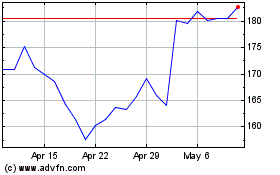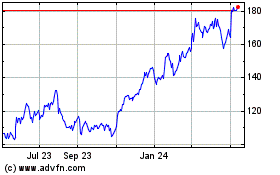By Ted Greenwald
In Qualcomm Inc.'s quest to avoid being swallowed by Broadcom
Ltd., its best bet to remain independent may be completing its own
giant acquisition. But it is running out of time.
Qualcomm has been working for more than a year to buy NXP
Semiconductors NV for $39 billion. Broadcom Chief Executive Hock
Tan has said his offer stands whether or not Qualcomm completes its
purchase, even though NXP would add 40% to Qualcomm's revenue and
give the combined companies a major presence in the fast-growing
market for chips used in cars.
Last week, Broadcom raised its bid for Qualcomm to more than
$121 billion from $105 billion in what would be technology's
biggest deal. In rejecting the revised bid Thursday, Qualcomm
accused Broadcom of ignoring the value NXP will bring, among other
criticisms. The Wall Street Journal reported Sunday that Broadcom
has secured as much as $100 billion of debt funding for its
Qualcomm bid.
The parties are scheduled to meet Wednesday, according to a
Broadcom spokesman. On Tuesday, Broadcom said it would lower the
number of independent Qualcomm directors it is nominating to six,
down from 11, a move it said would allow it to gain majority
control while ensuring some board continuity.
Even so, Mr. Tan had presented his target with a possible way
out, repeating a threat last week to withdraw if Qualcomm paid more
for NXP than it originally agreed to. While Mr. Tan appeared to
soften that stance on CNBC Monday, saying he would preserve his
options, Qualcomm could still put Broadcom on its heels by raising
its offer for NXP.
That is where things get dicey.
Qualcomm isn't likely to close the NXP acquisition until Chinese
antitrust authorities have approved the deal, its last regulatory
hurdle. On its recent earnings call, Qualcomm estimated it would
take three weeks to wrap up the acquisition once China gave the
green light, which it expected "soon." China's antitrust regulator
will take a week off for the Lunar New Year starting Feb. 15,
further squeezing the schedule.
Qualcomm, Broadcom and NXP all have said the price for NXP, $110
a share, is fair. But to close the deal, Qualcomm likely would have
to increase the price, because NXP shares have traded above the
offer price since the summer, and activist investor Elliott
Management Corp. is rallying investors to demand $135 a share.
In the best case, the closing of the NXP acquisition would
happen in time for Qualcomm's investor meeting, scheduled for March
6, giving it a notch on its belt before shareholders vote for
either Qualcomm's directors or a slate proposed by Mr. Tan.
A three-way tango between acquirers and targets isn't
unprecedented, especially in cases involving a third company lured
in as a "white knight," such as the dramatic 2014 battle between
Actavis PLC, Allergan Inc. and Valeant Pharmaceuticals
International Inc.
There is no white knight in the Broadcom-Qualcomm-NXP triangle,
but Qualcomm's completion of the NXP transaction at a higher price
would fortify it against a hostile takeover, analysts said.
"I can't recall when a very large company was trying to buy
another very large company, which was trying to buy yet another
large company," said Mike Walkley, an analyst with Canaccord
Genuity Group Inc. "Now that Qualcomm has rejected Broadcom's bid,
we believe management will likely move as fast as possible to buy
NXP once they receive regulatory approval."
Broadcom's sweetened offer failed to persuade investors. After
Broadcom announced the offer, Qualcomm shareholders pushed shares
down. The price now stands 20% below the revised offer price.
Some investors saw Mr. Tan's ultimatum as a misstep.
"You just told Qualcomm: close NXP over $110, you're off the
hook," said Steven Ré, investment chief at Fairbanks Capital
Management Inc. Qualcomm shares make up around 17% of the firm's
equity portfolios, he said.
Broadcom declined to comment on its revised bid. Qualcomm
declined to comment.
Qualcomm enters its March 6 shareholder meeting following nearly
three years of turbulence that lopped 22% from its stock price,
while the PHLX Semiconductor Index gained about 82%.
Shareholders can point to a litany of grievances, including
billions of dollars in fines from regulators over the way Qualcomm
conducts business and a price war with Apple Inc. that is keeping
billions of dollars in revenue out of its coffers as multiple cases
wind through courts. Securing NXP would give them confidence
Qualcomm can execute its plans.
"Qualcomm needs to close NXP more than ever," said Bernstein
Research analyst Stacy Rasgon, "and they'll have to offer a higher
price."
Qualcomm believes an NXP merger will supercharge its
opportunities in the markets for automotive chips, security and
equipment outfitted with computing and communications, known as the
Internet of Things -- a combined market it expects to be valued at
$77 billion by 2020, according to a recent presentation to
investors.
Broadcom has tried to cast doubt on the deal, saying in a recent
investor presentation that NXP's average revenue growth in the
first three quarters of 2017 was substantially slower than its
peers, and that it missed its own forecasts. Based on projections
in a late 2016 regulatory filing, NXP in fiscal 2017 fell short of
its goals for revenue and adjusted profit margins.
An NXP spokesman said the forecasts at issue were "management's
best-case scenarios" for presentation in advance of an
acquisition.
Write to Ted Greenwald at Ted.Greenwald@wsj.com
(END) Dow Jones Newswires
February 13, 2018 11:17 ET (16:17 GMT)
Copyright (c) 2018 Dow Jones & Company, Inc.
QUALCOMM (NASDAQ:QCOM)
Historical Stock Chart
From Mar 2024 to Apr 2024

QUALCOMM (NASDAQ:QCOM)
Historical Stock Chart
From Apr 2023 to Apr 2024
